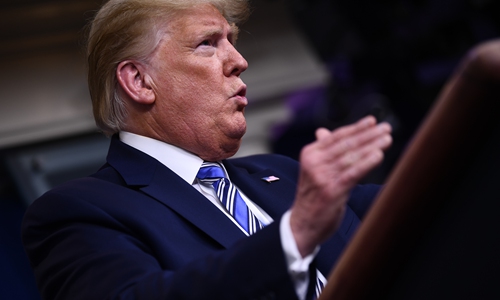HOME >> WORLD
Trump signs $2 trillion economic rescue package to cushion impact of COVID-19
Source:Xinhua Published: 2020/3/28 17:02:03

US President Donald Trump speaks during the daily briefing on the novel coronavirus, COVID-19, at the White House. Photo: AFP
US President Donald Trump on Friday signed into law a 2-trillion-dollar economic relief bill, the largest such aid package ever, in an attempt to mitigate the impact of the COVID-19 outbreak.
Earlier in the day, the House of Representatives swiftly passed the bill by voice vote. The Senate approved the package on Wednesday night, following rounds of strenuous negotiations between Democrats and Republicans.
"I want to thank Republicans and Democrats for coming together, setting aside their differences, and putting America first," Trump told reporters at a signing ceremony in the Oval Office of the White House.
Senior officials, including Treasury Secretary Steven Mnuchin and Republican leaders, were present in Congress, though no Democrats attended.
Trump's signing of the massive relief package came one day after newly released data showed the number of initial jobless claims had surged by 3 million to reach a record 3.3 million last week, the latest evidence of COVID-19's mounting damage to the US economy.
The White House had originally proposed a 1-trillion-dollar stimulus package, with several rounds of negotiations among lawmakers ballooning the package to over 2 trillion dollars, making it far bigger than the 700-billion-dollar Wall Street rescue package offered during the 2008 financial crisis.
The bill, aimed at cushioning the economy from the COVID-19 pandemic, will provide small businesses emergency loans, business tax breaks, expansion of unemployment benefits, 1,000-dollar-plus direct payments for working citizens, government aid for industries such as airlines and hotels, as well as more support for hospitals and state and local governments.
In a statement released Friday afternoon, the National Retail Federation (NRF) welcomed the approval of the bill. "This economic relief package provides a crucial bridge for the millions of American retail businesses and the retail jobs that will help support the US economy through this challenging time," NRF President and CEO Matthew Shay said.
Jason Furman, professor at Harvard University and former economic adviser to President Barack Obama, said on Twitter that the package is "emergency satisfactory", but more support might be needed.
"Triggers that would automatically extend & expand the various forms of assistance, tied to national or state economic situations," Furman said, "stimulus fatigue set in very quickly after 2009, I worry about the same here and would rather set a default of continuing."
Lawrence Summers, US treasury secretary for former President Bill Clinton and economic advisor to former President Barack Obama, stressed the urgency to contain the spread of the virus.
"10 trillion dollars of fiscal and monetary policy won't make our economy work if people are scared to go to work and the store," Summers said.
The United States has reported more than 104,000 confirmed COVID-19 cases and over 1,700 death as of Friday, topping the list of confirmed cases worldwide, according to a data tracking tool developed by the Center for Systems Science and Engineering at Johns Hopkins University.
As there is a spike in cases of COVID-19, the US public is advised to stay home, while flight and hotel bookings are canceled, major sports events are delayed, and dining and entertainment facilities, among others, are partially closed, leading to a surge in layoffs.
Numerous experts, including Federal Reserve Chairman Jerome Powell, believe that the US economy is already in recession. "We may well be in a recession," he told NBC News, noting that "if we get the virus spread under control fairly quickly then economic activity can resume."
According to a forecast released by the Institute of International Finance (IIF) earlier this week, the United States is already in recession, with negative growth in the first quarter and large contractions in the second quarter. By the year's end, the US economy is expected to have contracted by 2.8 percent.
"While containment is the main reason for the economy to stand still and get into a recession, containment is very necessary to come out of this period and step in to recovery," International Monetary Fund (IMF) Managing Director Kristalina Georgieva said at a video news conference Friday.
Posted in: AMERICAS